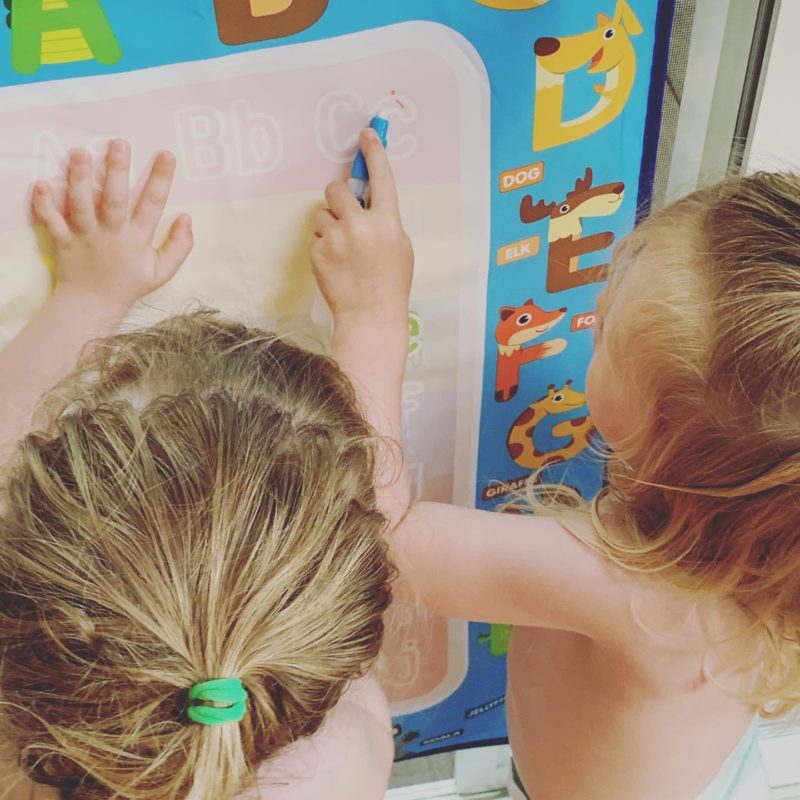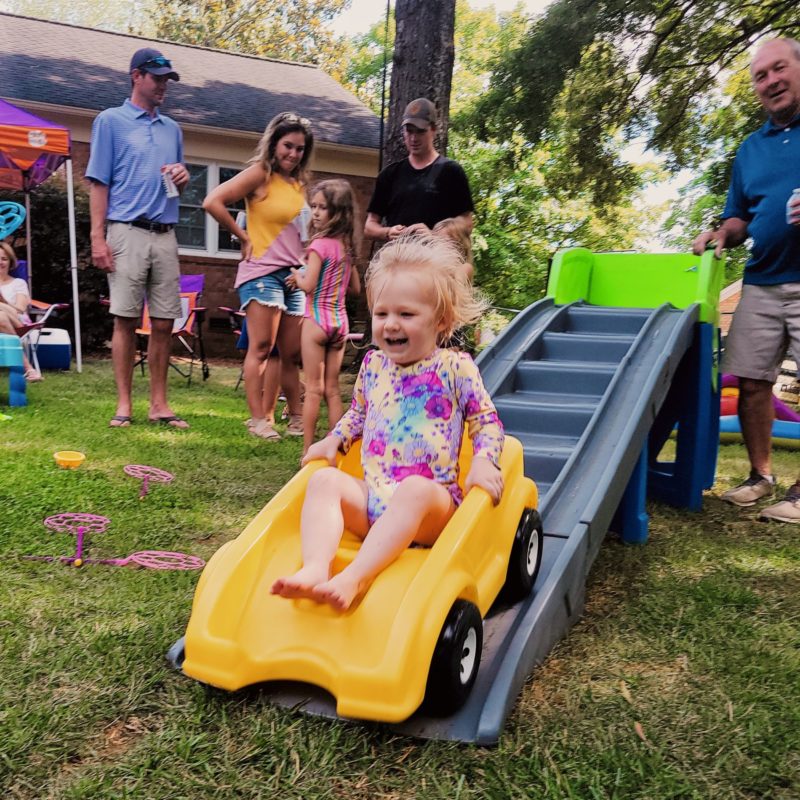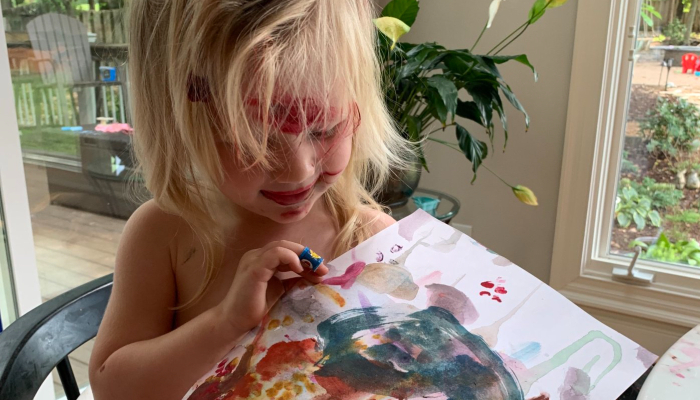By TMoM Team Member, Ashley Quinn Kibby
I’m not an expert on raising toddlers, but I am very much in it with a double dose of twenty-eight-month-olds. Twins. Mine talk incessantly, nap infrequently, and still poop in their diapers. Both are learning to put on their socks, buckle their shoes, and navigate the playground like pros. One likes to collect and relocate objects throughout the house while the other has taken to loudly narrating her experience with song (thanks, Cocomelon).
The three words I hear most often are “up,” “please,” and “mommy,” although they usually come smushed together in triples: “uppease uppease uppease!” and octets: “mommy mommy mommy mommy mommy mommy mommy mommy!” Whether we are at the table eating, coloring, or playing dough, I’m used to getting up about ten times to clean spills and fulfill odd requests. If my toddlers are not engaged by an activity or the television, they can become quite ornery.
According to Erik Erikson’s stages of psychosocial development, toddlerhood is defined by the emergence of autonomy through the act of trying new things and developing confidence. During this phase, the toddler uses their will to test abilities and boundaries, demonstrating characteristics like determination, persistence, and inflexibility. The most-dreaded meltdown is just one behavior that can result from a toddler being told their most-dreaded word: “No.”
In addition to managing our toddlers’ emotional needs, caregivers must also manage their nutrition, sleep, and social requirements, which may look something like twenty-one meals, fourteen snacks, a couple playdates and a handful of 3am night terrors per week. All-in-all, it’s a delicate act of balancing their bids for autonomy with our efforts to keep them safe and healthy while minimizing messes and stresses.
So, how can we survive this demanding stage of development, and potentially thrive through it? Here’s ten tips collected from my experience and validated by the Greensboro Mothers of Multiples — And since this one won’t fit in the list, here’s a bonus tip: Get yourself a mom group! Our ability to learn and relate through sharing our struggles, victories, pains, and joys are essential to the journey.

Toddlerhood Tip 1: Set reasonable goals.
The Sistine Chapel wasn’t built overnight. Aim to accomplish a couple things a day. Maybe you fold laundry or put away the laundry that’s been folded for a week. Whether your goal is to create a to-do list or cross a couple things off it, setting achievable goals reinforces your self-image as capable, competent, and productive. Now you’re creating order in your house and your mind — how’s that for multi-tasking!?
Toddlerhood Tip 2: Honor your achievements.
Each day with toddlers brings triumphs and failures. Focus on the positive by identifying and celebrating your wins, no matter the size, quality, or quantity. Perhaps you set aside household responsibilities to become more available for family. Maybe you make time to meditate when you’re approaching burnout. Or call in a babysitter to meet a deadline at work. These are all winning examples of winning! I guarantee, there’s at least one thing a day you can be proud of — whatever it is, find it and give yourself a high five.
Toddlerhood Tip 3: Be mindful.
Believe it or not, mindfulness and toddlerhood go hand in hand. When you talk to a two-year old about what’s on the wall, the shape of objects, or feelings of excitement, you’re noticing colors, sizes, and emotions. This is mindfulness. When you get into a rhythm sorting clothes and toys or separating playdough colors, this is mindfulness. When you free yourself from attachment to specific outcomes, this is also mindfulness. So, when you reframe menial or mind-numbing activities into your mindfulness practice, you can reduce stress and increase patience. Add fifteen minutes of yoga a day and you’re basically a Tibetan monk.

Toddlerhood Tip 4: Be mindless.
Toddler caregiving is a full-court press of engagement, so the need to shut off is only natural. In psychology circles, the practice of emotional rest has become an increasingly prevalent therapy. Some moms swear by a glass or two of wine. Others, a gab sesh with friends or Reality TV binge (I’m partial to Hulu’s Dating: No Filter). Whatever offers you a little escape from toddler life, aim to find a balance and enjoy the relief. Giving yourself regular emotional rest is critical to meeting the persistent emotional demands of your children.
Toddlerhood Tip 5: Keep a schedule.
Routinely scheduled meal, sleep, and activity times can help your toddler anticipate what’s next. This gives them a greater sense of control, facilitates regular practice of your daytime activities, and reduces the potential for power struggles. According to studies, routine can also help reduce anxiety in adults. When we feel in control of our day, we feel in control of our lives.
Toddlerhood Tip 6: Change the schedule.
Since toddlers are rapidly developing and hitting new milestones every few weeks, it’s important to attune yourself to their emotional cues and allow room for adjustment to planned activities. During this developmental phase, your toddler may drop their nap, learn to climb a jungle gym, or unlearn how to stay seated at a restaurant. As they acquire new skills through novel experiences, things that were difficult for you will become easy, and things that were easy will become difficult. When you hit a hurdle, always remember — this too shall pass.

Toddlerhood Tip 7: Share intentions.
Talking your toddler through upcoming activities is another way to support their sense of control. At bedtime, share something you’re looking forward to tomorrow. When wrapping an activity, let them know what’s next. Your typical toddler won’t be able to process a week’s itinerary but can usually handle a sequence of two: “After we clean up our toys, we will watch a show”. It’s also good to offer simple reasons for your requests. Many toddler corrections like standing in their highchair, throwing things, and running away can be explained as simply as “That’s not safe; it’s my job to keep you safe.” Phrases like “because I said so” do little for autonomous development.
Toddlerhood Tip 8: Offer options.
What’s more empowering than knowing your options and deciding what’s right for you? For your toddler, it may be choosing between a Baby Shark or Frozen band-aid. An apple or an orange. Sharing their toy or having it taken away. When you frame an action as a simple either/or choice, you reduce potential friction by honoring your toddlers’ drive for autonomy.
Toddlerhood Tip 9: Get help — especially from your toddler!
Obviously, a support system is essential for success, whether it’s shared caregiving responsibilities with your spouse, babysitter, preschool, or family member(s). But did you know your toddler is also capable of helping, and gains confidence from doing so? Many toddlers can help put trash in the garbage, plates on the counter, toys in the bin, and clothes on their bodies! While this may take extra time and attention in the beginning, you’ll set your toddler up with essential skills and social support instincts that serve their development and help you along the way.
Toddlerhood Tip 10: Have fun with it.
Interacting with toddlers can be an opportunity for your creative expression, too! Singing songs, drawing pictures, dressing up, planting a garden, and playing make-believe can bring you out of the doldrums of adulting and into your imagination. When examining opportunities for fun, think less about what your toddlers should be doing at subjective milestones and more about what brings you joy to do together.
With toddlers, the path of least resistance is often the easiest and best road to take, especially when the alternative is a nerve-rattling tantrum. But that doesn’t mean you have to give in to their every whim and desire. Try these ten tips to smooth out the bumps of toddlerhood and let us how they work for you in the comments! Got another toddler tip? We’d love to hear it!


















Wow, that’s a great approach you have here. I love it! Consistency versus flexibility – you seem to have it both. Amazing.
I must try it with my crazy toddler. She’s one now and she’s giving me a hard time lately. Although since we’ve followed the sleep training book (this book: https://www.parental-love.com/shop/toddler-sleep-training – I’ve found it very helpful) it is much better now. But with your positive thinking I guess it may be almost perfect! Maybe I just need doable goals.
Thank you for the article. Great perspective.
Thank you so much Scott!!
Excellent tips, and welcome to the TMoM team, Ashley!
Thank you so much Katie!!